Alibaba'IPO
阿里巴巴赴美IPO

阿里巴巴赴美IPO,祝贺与遗憾阿里巴巴美国时间6日正式提交赴美IPO(首次公开募股)申请,拟在纽约证券交易所或纳斯达克全球市场挂牌。
这件事虽按部就班进行,但6日的节点还是在美国及西方造成轰动效应。
阿里巴巴赴美IPO占据了当天西方一些主流网站的头条位置。
应当祝贺阿里巴巴,祝贺马云。
然而不少中国分析人士的感受又是五味杂陈的。
阿里巴巴堪称当下中国最成功的民营企业之一,但这块投资的肥肉如今就要落到美国和西方人的盘子里。
这既是遗憾,也大概更多是无奈。
阿里巴巴1999年创办之后,成长的资金动力就来自外国风险投资。
中国网上消费者和外国资本共同支持了它,阿里巴巴如今的最大股东是日本的软银和美国的雅虎,要让阿里巴巴在国内上市,有着一系列的政策和资本障碍。
阿里巴巴作为一家公司,要在全球寻找最有利的发展条件,它在中国的土壤里扎根,受到外国资本的雨露浇灌,因而壮大成全球最大的电商。
虽然它的首次融资目标只有10亿美元,但美国媒体普遍预估,它的最终募资额有可能接近200亿美元,成为美国资本市场历史上最大的IPO。
准确说,阿里巴巴是个全球化时代的“混血儿”,它让人看到中国的金融发展和难以估量的潜力,也让我们清楚了中国从风险投资到企业进一步融资领域所面临的种种缺陷。
阿里巴巴作为互联网时代的真正“跨国公司”,它不断从全球范围为自己找寻每一个“最好的”机会,从而让自己走到世界“第一”的位置。
这是我们当下必须接受的现实,它也为中国的改进提供了显而易见的目标。
中国不一定要让这里的大公司“很纯”,但我们应当具有用更多“国产化”方式培育全球互联网巨头的能力。
我们期待如果中国再有阿里巴巴或者腾讯的时候,它们资本意义上的“国产化率”能够高一些。
即使在阿里巴巴这一个公司的身上,我们也能看到当下中国与发达国家“分工”上的差距。
中国提供劳动力,提供市场,美日站在金融的“高端”。
对这样的格局,我们很难从合理或不合理的角度细究,我们眼看着它在阿里巴巴成长的这十几年里一步步成形,我们几乎别无选择。
阿里巴巴IPO案例PPT课件
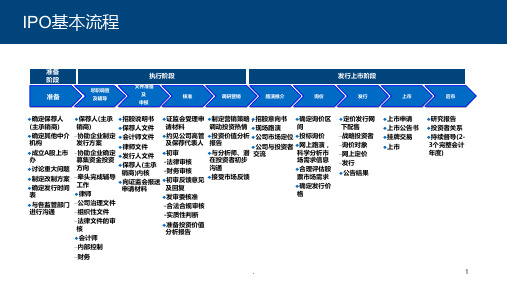
.
17
3. 上市效应
.
18
内容描述
3.1
巨大的造福 效应
3.2首创的 生态系统
效应
.
19
3.1 巨大的造福效应
阿里开盘价报92.7美元,较发行价上涨
13 6.3%,市值达到 2383.32亿美元,为美 股第9大公司
2
阿里的上市造就了中国和日本的两位 新首富
阿里巴巴此次IPO可为员工带来大约
3 448.56亿美元的巨额财富,阿里持股员
研究报告
投资者关系
持续督导(23个完整会计 年度)
.
1
中介结构 的遴选
上市 地点的选择
公司治理 结构建立
企业上市 面临的问题
时机的把握
定价区间 的确定
重组改制 方案的制定
战略投资者 选择
2020/5/27
.
2
战略投资者选择
战略投资 者
“战略投资者”,是相对于上市公司发 起人的称呼,指的是投资于上市公司,与 上市公司具有一致价值取向,具备投资长 期性、业务关联性、结构互补性等特性的 境内外投资机构。其角色经常由投资银行、 养老基金和保险公司等机构担任。战略投 资者总体可分为两类,一类是财务投资者, 即上市套现的类型;另一类是行业投资者, 即以实现产业转移和发展为主要目的的境 内外大企业、大集团,是企业真正希望的 战略投资者。行业投资者的投资特征为: 对企业的控制权要求较低;拥有董事会席 位、参与重大决策,但不介入企业经营; 定期对企业进行战略审视和业绩评估;注 重投资回报倍数。
• (4)政策面的风险更具挑战,阿里已经成为巨头企业,它的每 一步关键行动,都可能触及生态或垄断力量的利益。
.
29
阿里巴巴IPO案例
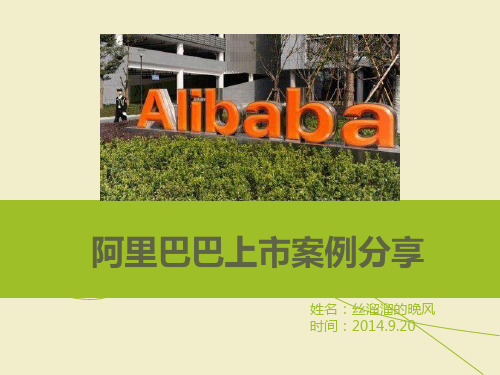
阿里巴巴股权结构
董事和高管持股 ◇马云持有206,100,673股普通股, 持股比例8.9%; ◇蔡崇信持有83,499,896股普通股, 持股比例3.6%; ◇其余董事或高管持股比例不到 1%。
机构持股 ◇软银持有797,742,980股普通股, 持股比例34.4%; ◇雅虎持有523,565,416股普通股, 持股比例22.6%;
阿里巴巴上市案例分享
姓名:丝溜溜的晚风 时间:2014.9.20
阿里巴巴8名生态代表敲响纽交所开市钟
敲钟人共有八位:两位网店店主、快递员、用户代表、一位电商服务商、 网络模特和云客服,还有一位是来自美国的农场主皮特· 维尔布鲁格。
当地时间9月19日上午9点半,阿里巴巴在纽约证券交易所敲钟上市,开 盘价92.7美元,和IPO发行价68美元相比,大涨了36%; 截至收盘,其股价进一步上涨至93.89美元,总市值约为2,400亿美元, 成为仅次于谷歌公司的全球第二大互联网公司。
一张图看懂阿里巴巴
一张图看懂阿里巴巴
一张图看懂阿里巴巴
一张图看懂阿里巴的董事及高管持股情况
一张图看懂阿里巴巴
一张图看懂阿里巴巴
一张图看懂阿里巴巴
一张图看懂阿里巴巴
一张图看懂阿里巴巴
一张图看懂阿里巴巴股权
一张图看懂阿里巴巴股权
一张图看懂阿里巴巴股权
一张图看懂阿里巴巴股权
一张图看懂阿里巴巴股权
一张图看懂阿里巴巴股权
一张图看懂阿里巴巴股权
阿里巴巴上市历程及估值过程
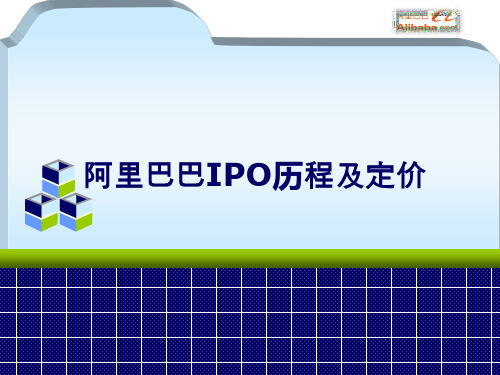
阿里巴巴IPO历程及定价
Contents
1 2 3 4 5
阿里简介 IPO历程 重点事件剖析 IPO定价 启示
1、阿里简介
阿里巴巴(纽交所,证券代码“BABA”)为全球领先
的小企业电子商务公司,也是阿里巴巴集团的旗舰业务。 阿里巴巴在1999年成立于中国杭州市,通过旗下三个 交易市场协助世界各地数以百万计的买家和供应商从事 网上生意。三个网上交易市场包括:集中服务全球进出 口商的国际交易市场、集中国内贸易的中国交易市场, 以及透过一家联营公司经营、促进日本外销及内销的日 本交易市场。此外,阿里巴巴也在国际交易市场上设有 一个全球批发交易平台,为规模较小、需要小批量货物 快速付运的买家提供服务。
ipo案例分析

ipo案例分析IPO案例分析。
IPO(Initial Public Offering)即首次公开发行,是指一家公司首次将股份公开发行给投资者,从而进入证券市场,成为上市公司。
IPO案例分析是对公司进行上市前后的财务状况、市场表现、经营策略等方面的分析,以便投资者、学者和管理者了解公司上市的影响和意义。
下面我们将以几个经典的IPO案例为例,进行分析。
首先,让我们来看看阿里巴巴的IPO案例。
阿里巴巴集团是中国最大的电子商务公司,2014年在纽约证券交易所进行了IPO。
在上市之前,阿里巴巴的业务已经非常成熟,市场地位稳固,因此其IPO备受瞩目。
通过IPO,阿里巴巴融资规模达到了250亿美元,成为当时全球最大的IPO案例。
上市后,阿里巴巴股价一路飙升,市值迅速超过3000亿美元。
这个案例表明,一家成熟的互联网公司通过IPO可以获得大量的资金支持,进一步扩大市场份额,实现更快速的发展。
其次,我们来看看Facebook的IPO案例。
Facebook是全球最大的社交网络公司,2012年在纳斯达克进行了IPO。
然而,与阿里巴巴不同,Facebook的IPO并不顺利。
上市初期,股价一度下跌,投资者信心受到严重打击。
这主要是因为Facebook在上市前并未解决好移动端广告收入问题,导致投资者对其盈利能力产生怀疑。
这个案例告诉我们,一家公司在进行IPO前,必须要解决好自身的经营问题,否则可能会遭遇市场的冷遇。
最后,让我们来看看小米的IPO案例。
小米是中国知名的移动互联网公司,2018年在香港进行了IPO。
与阿里巴巴类似,小米上市前已经取得了可观的业绩,备受市场关注。
然而,小米的股价在上市后并未如预期一般表现,一度下跌。
这主要是因为市场对小米商业模式的可持续性产生了质疑。
小米主要依靠硬件销售获取利润,而这种模式在竞争激烈的市场中难以持续。
这个案例告诉我们,一家公司在进行IPO时,必须要明确自身的商业模式,以及未来的发展战略,才能获得市场的认可。
企业因ipo更名的例子及原因

企业因ipo更名的例子及原因企业因IPO更名的例子及原因IPO是指企业首次公开发行股票,上市交易。
在IPO过程中,企业通常会选择更名以符合证券交易所的规定。
这种更名的原因不仅仅是为了适应证券市场的要求,还为企业未来的发展提供更好的空间。
以下是一些因IPO而更名的企业例子及原因。
1. 阿里巴巴(Alibaba)阿里巴巴是一个中国电子商务企业,成立于1999年。
在2007年,阿里巴巴通过IPO在香港交易所上市。
在上市前夕,阿里巴巴公司更名为阿里巴巴集团控股有限公司(Alibaba Group Holding Limited)。
更名的原因是为了符合香港证券交易所的规定,需要在公司名称中包含Holding Limited等字眼,以表示公司的上市状态。
2. 腾讯控股(Tencent Holdings Limited)腾讯控股是一家中国互联网公司,成立于1998年。
在2004年,腾讯控股通过IPO在香港交易所上市。
在上市前,腾讯公司更名为腾讯控股有限公司,以符合香港证券交易所的规定。
3. 京东集团()京东集团是一家中国电子商务公司,成立于1998年。
在2014年,京东集团通过IPO在纳斯达克上市。
在上市前,京东商城更名为京东集团有限公司,以展示其在电子商务领域多元化的业务结构。
4. 美团点评(Meituan Dianping)美团点评是一家中国在线交易服务公司,成立于2010年。
在2018年9月20日,美团点评通过IPO在香港交易所上市。
在上市前,美团与大众点评网两个品牌未合并。
此次IPO更名为美团点评旨在展示其在多个领域的多样化布局。
总之,企业因IPO而更名通常是为了适应证券市场的规定和标准,并为未来的业务发展提供更广阔的空间。
这些企业通过更名表明,他们将以更加多元化的方式发展,以便在全球化的商业环境下从容应对。
关于阿里巴巴IPO,这些问题值得关注
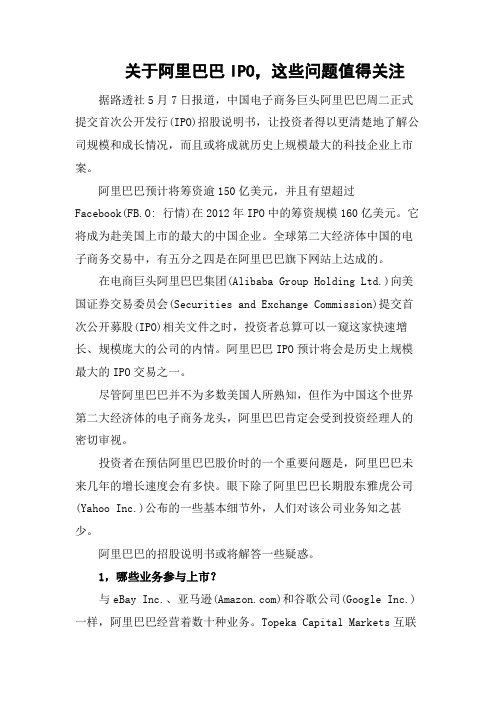
关于阿里巴巴IPO,这些问题值得关注据路透社5月7日报道,中国电子商务巨头阿里巴巴周二正式提交首次公开发行(IPO)招股说明书,让投资者得以更清楚地了解公司规模和成长情况,而且或将成就历史上规模最大的科技企业上市案。
阿里巴巴预计将筹资逾150亿美元,并且有望超过Facebook(FB.O: 行情)在2012年IPO中的筹资规模160亿美元。
它将成为赴美国上市的最大的中国企业。
全球第二大经济体中国的电子商务交易中,有五分之四是在阿里巴巴旗下网站上达成的。
在电商巨头阿里巴巴集团(Alibaba Group Holding Ltd.)向美国证券交易委员会(Securities and Exchange Commission)提交首次公开募股(IPO)相关文件之时,投资者总算可以一窥这家快速增长、规模庞大的公司的内情。
阿里巴巴IPO预计将会是历史上规模最大的IPO交易之一。
尽管阿里巴巴并不为多数美国人所熟知,但作为中国这个世界第二大经济体的电子商务龙头,阿里巴巴肯定会受到投资经理人的密切审视。
投资者在预估阿里巴巴股价时的一个重要问题是,阿里巴巴未来几年的增长速度会有多快。
眼下除了阿里巴巴长期股东雅虎公司(Yahoo Inc.)公布的一些基本细节外,人们对该公司业务知之甚少。
阿里巴巴的招股说明书或将解答一些疑惑。
1,哪些业务参与上市?与eBay Inc.、亚马逊()和谷歌公司(Google Inc.)一样,阿里巴巴经营着数十种业务。
Topeka Capital Markets互联网媒体分析师安东尼(Victor Anthony)称,阿里巴巴种类繁多的业务令美国投资者感到困惑。
他说,投资者不确定IPO到底包括哪些资产。
阿里巴巴的淘宝网()是一家消费者间(C2C)购物平台,而耐克(Nike)、迪斯尼(Disney)等品牌在阿里巴巴旗下天猫网()上向中国客户直接销售产品。
与亚马逊的互联网服务部门一样,阿里巴巴也设有云计算业务,企业可租用其计算器,通过互联网进行数据存储和处理,而无需自行购买服务器。
阿里最大IPO上演“最后的疯狂”
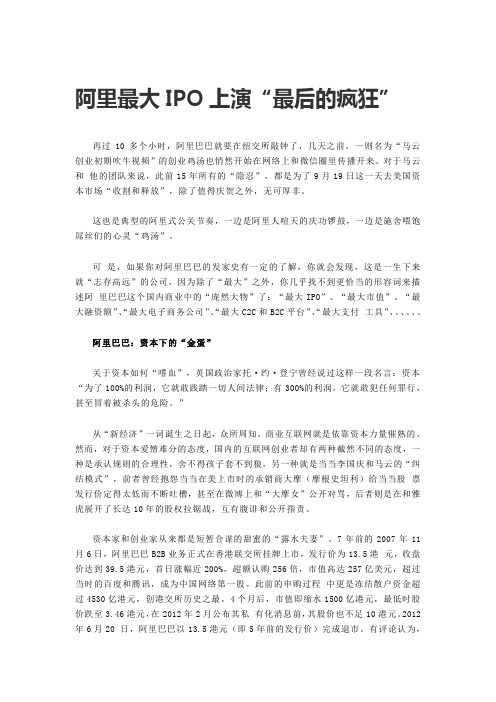
阿里最大IPO上演“最后的疯狂”再过10多个小时,阿里巴巴就要在纽交所敲钟了,几天之前,一则名为“马云创业初期吹牛视频”的创业鸡汤也悄然开始在网络上和微信圈里传播开来。
对于马云和他的团队来说,此前15年所有的“隐忍”,都是为了9月19日这一天去美国资本市场“收割和释放”,除了值得庆贺之外,无可厚非。
这也是典型的阿里式公关节奏,一边是阿里人喧天的庆功锣鼓,一边是施舍喂饱屌丝们的心灵“鸡汤”。
可是,如果你对阿里巴巴的发家史有一定的了解,你就会发现,这是一生下来就“志存高远”的公司,因为除了“最大”之外,你几乎找不到更恰当的形容词来描述阿里巴巴这个国内商业中的“庞然大物”了:“最大IPO”、“最大市值”、“最大融资额”、“最大电子商务公司”、“最大C2C和B2C平台”、“最大支付工具”、、、、、、阿里巴巴:资本下的“金蛋”关于资本如何“嗜血”,英国政治家托·约·登宁曾经说过这样一段名言:资本“为了100%的利润,它就敢践踏一切人间法律;有300%的利润,它就敢犯任何罪行,甚至冒着被杀头的危险。
”从“新经济”一词诞生之日起,众所周知,商业互联网就是依靠资本力量催熟的。
然而,对于资本爱憎难分的态度,国内的互联网创业者却有两种截然不同的态度,一种是承认规则的合理性,舍不得孩子套不到狼,另一种就是当当李国庆和马云的“纠结模式”,前者曾经抱怨当当在美上市时的承销商大摩(摩根史坦利)给当当股票发行价定得太低而不断吐槽,甚至在微博上和“大摩女”公开对骂,后者则是在和雅虎展开了长达10年的股权拉锯战,互有腹诽和公开指责。
资本家和创业家从来都是短暂合谋的甜蜜的“露水夫妻”。
7年前的2007年11月6日,阿里巴巴B2B业务正式在香港联交所挂牌上市,发行价为13.5港元,收盘价达到39.5港元,首日涨幅近200%,超额认购256倍,市值高达257亿美元,超过当时的百度和腾讯,成为中国网络第一股。
此前的申购过程中更是冻结散户资金超过4530亿港元,创港交所历史之最。
阿里巴巴IPO前后股权结构、市值及马云财富
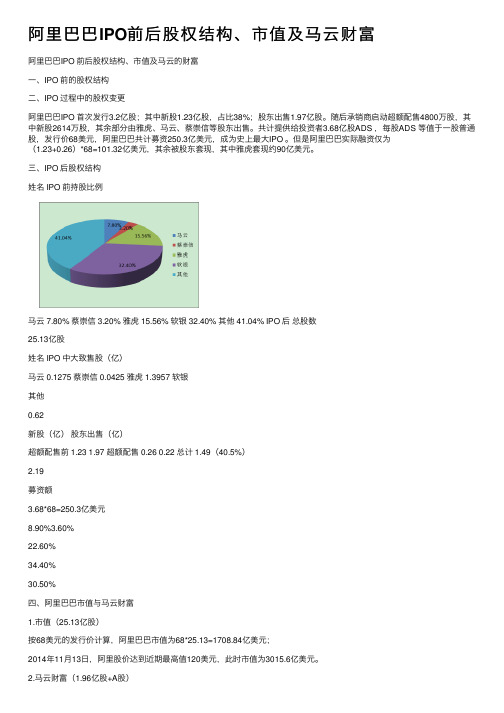
阿⾥巴巴IPO前后股权结构、市值及马云财富阿⾥巴巴IPO 前后股权结构、市值及马云的财富⼀、IPO 前的股权结构⼆、IPO 过程中的股权变更阿⾥巴巴IPO ⾸次发⾏3.2亿股;其中新股1.23亿股,占⽐38%;股东出售1.97亿股。
随后承销商启动超额配售4800万股,其中新股2614万股,其余部分由雅虎、马云、蔡崇信等股东出售。
共计提供给投资者3.68亿股ADS ,每股ADS 等值于⼀股普通股,发⾏价68美元,阿⾥巴巴共计募资250.3亿美元,成为史上最⼤IPO 。
但是阿⾥巴巴实际融资仅为(1.23+0.26)*68=101.32亿美元,其余被股东套现,其中雅虎套现约90亿美元。
三、IPO 后股权结构姓名 IPO 前持股⽐例马云 7.80% 蔡崇信 3.20% 雅虎 15.56% 软银 32.40% 其他 41.04% IPO 后总股数25.13亿股姓名 IPO 中⼤致售股(亿)马云 0.1275 蔡崇信 0.0425 雅虎 1.3957 软银其他0.62新股(亿)股东出售(亿)超额配售前 1.23 1.97 超额配售 0.26 0.22 总计 1.49(40.5%)2.19募资额3.68*68=250.3亿美元8.90%3.60%22.60%34.40%30.50%四、阿⾥巴巴市值与马云财富1.市值(25.13亿股)按68美元的发⾏价计算,阿⾥巴巴市值为68*25.13=1708.84亿美元;2014年11⽉13⽇,阿⾥股价达到近期最⾼值120美元,此时市值为3015.6亿美元。
2.马云财富(1.96亿股+A股)马云在IPO后持股25.13*7.8%=1.96亿股,按发⾏价算拥有阿⾥财富为133亿美元;按120美元的最⾼价计算为235.2亿美元;考虑到马云在在A股市场还直接持有4.03%的华谊兄弟、间接持有恒⽣电⼦20.44%股权,此部分市值约为90亿⼈民币;以上两部分即为马云财富的⼤致估计。
阿里巴巴IPO案例分析
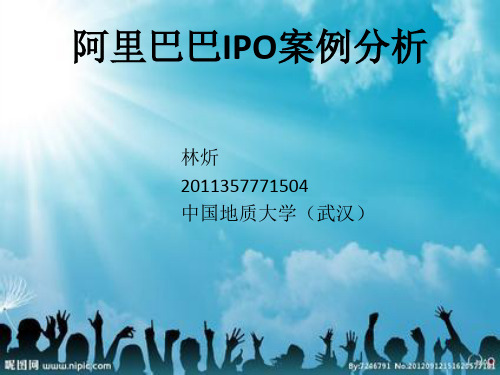
如何定价
巴克莱银行是这次阿里巴巴的指定做市商,接下来巴克莱银行将开 始一个开盘价询价过程:公司的指定做市商巴克莱和高盛银行将一起来 决定是最合适的开盘价——除了决定开盘价以外,还要决定什么时候开 盘。通常来将,美东时间九点半刚开盘的时候没有交易的,有时要等到 10-30分钟来开始交易。不管是买单还是卖单,所有信息都会汇总在巴克 莱银行。巴克莱和高盛会看到买盘和卖盘的力量,然后来决定什么价格、 什么时候开盘。
6月26日,阿里巴巴决定申请在美国纽约证券交易所挂牌上市,股票交易代 码为“BABA”。
9月5日,阿里巴巴预估其IPO发行价在每股美国存托股(ADS)60美元到66美元。 拟发行3.20亿股美国存托股。此外,阿里巴巴还赋予上市承销商最多4802万股美 国存托股的超额认购权。
9月15日,阿里巴巴将IPO发行价预估区间提至每股美国存托股66美元到 68美元。 9月18日,阿里巴巴将其IPO发行价确定为每股美国存托股68美元,融资 额为218亿美元,超越维萨卡公司成为美国最大的IPO。如承销商行使超额认 购权,阿里巴巴有望创下全球IPO融资额最高纪录。 9月19日,阿里巴巴在美国纽约证券交易所正式挂牌交易,股票交易代 码为“BABA”。
中国电商巨头阿里巴巴18日宣布,将其首次公开募股(IPO)发行价确定为 每股美国存托股(ADS)68美元,这标志着美国融资额最大的IP算,阿里巴巴IPO融资额将达 218亿美元,一举打破尘封6年半之久的美国IPO融资额纪录。此前的纪录为维萨 卡公司2008年3月上市所创,融资额为197亿美元。
阿里巴巴IPO案例分析
林炘 2011357771504 中国地质大学(武汉)
阿里巴巴在美如何注册
3月16日,阿里巴巴宣布,决定启动赴美上市事宜,以使公司更加透明、国 际化,进一步实现阿里巴巴的长期愿景和理想。 5月6日,阿里巴巴向美国证券交易委员会(SEC)提交了首次公开募股(IPO)申请, 确定阿里巴巴的上市承销商为瑞士信贷银行、德意志银行、高盛、摩根大通、摩 根士丹利和花旗集团。 6月16日,阿里巴巴首次公布了27名合伙人名单、任职情况,同时公布了未 来上市公司的9名董事会成员名单,以及最新财务数据。
阿里巴巴为何不在国内上市?IPO重启所面临的最大困境是什么?

阿里巴巴为何不在国内上市?网友“港城一丁”:阿里巴巴递交赴美上市招股书了,之前阿里一直希望到香港上市,最后因为“合伙人制度”与港交所上市原则冲突才作罢。
不过好像从没提过在国内股票市场上市,为什么?腾讯科技:阿里巴巴集团今天凌晨向美国证券交易委员会提交IPO招股书,计划赴美上市。
招股书显示,阿里巴巴将最多融资10亿美元。
关于阿里巴巴上市地点的争论目前有了结果,确实如网友所说,阿里巴巴一直没有考虑在国内股票市场上市。
之所以这样,原因可能包括:一、拆除VIE结构操作复杂阿里巴巴采用了VIE架构,这种架构在国内被称为“协议控制”,指的是境外注册的上市实体与境内的业务运营实体相分离,境外的上市实体通过设在境内的外商独资企业以协议的方式控制境内的业务实体。
阿里巴巴在国内上市就需要将境外权益转到境内,过程中涉及到系列协议的终止、废除等诸多法律问题,需要付出相应的对价。
软银、雅虎持有阿里巴巴开曼公司股份,阿里巴巴开曼公司通过VIE结构控制境内阿里巴巴集团的权益。
如果把阿里巴巴开曼公司变成空壳,权益转回到境内,不再向其输送利益,软银、雅虎持有的就变成了空壳。
即使二者愿意退出,阿里巴巴集团按照上市的价格赎买股份,如果阿里巴巴集团估值达到千亿美元,雅虎软银所持股份加起来估值几百亿美元。
通常拆除VIE架构,可以通过内地人民币基金接盘。
但阿里巴巴体量这么大,没人能接这个盘子。
此前通过拆除VIE结构实现在境内上市的公司规模相对不高,估值只有约10亿-20亿元人民币。
二、牵扯到的税务、审计和时间成本高昂阿里巴巴集团之前为上市所做的准备,包括文件、期权等方面,都是按照境外规则设计。
如果转回境内,一是面临大量税收,二是需要按照境内的会计准则重新设计。
税务、审计的成本非常惊人,超出想象。
三、登陆A股不利于阿里巴巴的国际化进程如果在美国上市,阿里巴巴可以用美国上市的股份直接做股权并购,成本很低。
如果转移到国内,对未来在国际上并购无正面影响,不是理性的做法。
阿里巴巴上市IPO的动机是
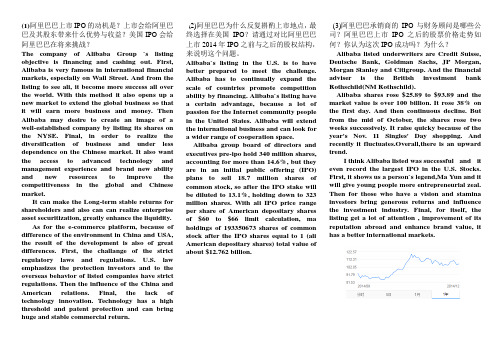
(1)阿里巴巴上市IPO的动机是?上市会给阿里巴巴及其股东带来什么优势与收益?美国IPO会给阿里巴巴在将来挑战?The company of Alibaba Group `s listing objective is financing and cashing out. First, Alibaba is very famous in international financial markets, especially on Wall Street. And from the listing to see ali, it become more success all over the world. With this method it also opens up a new market to extend the global business so that it will earn more business and money. Then Alibaba may desire to create an image of a well-established company by listing its shares on the NYSE. Final, in order to realize the diversification of business and under less dependence on the Chinese market. It also want the access to advanced technology and management experience and brand new ability and new resources to improve the competitiveness in the global and Chinese market.It can make the Long-term stable returns for shareholders and also can can realize enterprise asset securitization, greatly enhance the liquidity.As for the e-commerce platform, because of difference of the environment in China and USA, the result of the development is also of great differences. First, the challange of the strict regulatory laws and regulations. U.S. law emphasizes the protection investors and to the overseas behavior of listed companies have strict regulations. Then the influence of the China and American relations. Final, the lack of technology innovation. Technology has a high threshold and patent protection and can bring huge and stable commercial return.(2)阿里巴巴为什么反复斟酌上市地点,最终选择在美国IPO?请通过对比阿里巴巴上市2014年IPO之前与之后的股权结构,来说明这个问题。
资本运作阿里巴巴的IPO案例

资本运作阿里巴巴的IPO案例阿里巴巴是中国著名的互联网公司,其资本运作中的IPO(首次公开募股)案例备受关注。
本文将围绕阿里巴巴的IPO案例展开讨论,并深入探究其背后的资本运作。
一、引言阿里巴巴于2014年9月19日在美国纳斯达克交易所进行了规模庞大的全球IPO,募得了约250亿美元。
这一IPO案例成为了互联网行业乃至全球资本市场的焦点。
本文将对阿里巴巴IPO案例进行详细解析。
二、背景介绍1. 阿里巴巴的发展历程阿里巴巴成立于1999年,起初是一个面向全球的企业电子商务平台。
随着时间的推移,阿里巴巴逐渐扩大了其业务范围,涵盖了电子商务、云计算、数字娱乐、金融服务等领域。
其业务板块涵盖了淘宝网、天猫、支付宝等众多知名互联网品牌。
2. IPO的背景和目的阿里巴巴IPO的背景是为了融资和扩大公司的全球影响力。
通过IPO,阿里巴巴能够吸引全球投资者的关注,并为其未来的发展提供资金支持。
三、IPO过程1. 预备工作在进行IPO之前,阿里巴巴需要完成一系列的预备工作,例如制定IPO计划、选择承销商、进行财务审计等。
这些工作对于后续的IPO 流程至关重要。
2. 定价和发行阿里巴巴IPO的定价是在投资者询价过程中完成的。
公司选择了一批知名的承销商来帮助其完成定价和发行工作。
通过投资者的需求和市场情况,确定了最终的发行价。
3. 上市交易阿里巴巴选择在美国纳斯达克交易所进行上市交易。
上市首日,阿里巴巴股票表现强劲,成为历史上规模最大的IPO之一。
四、影响与启示1. 全球投资者对中国市场的看好阿里巴巴IPO案例反映了全球投资者对中国市场的看好。
阿里巴巴作为中国互联网行业的领军企业,其IPO成功为中国企业走向国际资本市场树立了典范。
2. 投资者对互联网公司的兴趣阿里巴巴IPO案例也凸显了投资者对互联网公司的浓厚兴趣。
在信息技术飞速发展的背景下,互联网公司成为了投资者眼中的热门。
阿里巴巴的IPO成功为其他互联网公司的资本运作提供了借鉴和参考。
阿里巴巴IPO记录谁来打破?
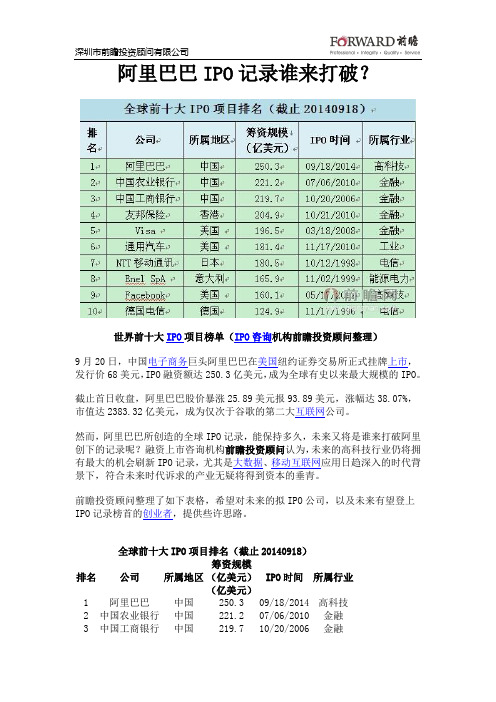
阿里巴巴IPO记录谁来打破?世界前十大IPO项目榜单(IPO咨询机构前瞻投资顾问整理)9月20日,中国电子商务巨头阿里巴巴在美国纽约证券交易所正式挂牌上市,发行价68美元,IPO融资额达250.3亿美元,成为全球有史以来最大规模的IPO。
截止首日收盘,阿里巴巴股价暴涨25.89美元报93.89美元,涨幅达38.07%,市值达2383.32亿美元,成为仅次于谷歌的第二大互联网公司。
然而,阿里巴巴所创造的全球IPO记录,能保持多久,未来又将是谁来打破阿里创下的记录呢?融资上市咨询机构前瞻投资顾问认为,未来的高科技行业仍将拥有最大的机会刷新IPO记录,尤其是大数据、移动互联网应用日趋深入的时代背景下,符合未来时代诉求的产业无疑将得到资本的垂青。
前瞻投资顾问整理了如下表格,希望对未来的拟IPO公司,以及未来有望登上IPO记录榜首的创业者,提供些许思路。
全球前十大IPO项目排名(截止20140918)排名公司所属地区筹资规模(亿美元)(亿美元)IPO时间所属行业1 阿里巴巴中国250.3 09/18/2014 高科技2 中国农业银行中国221.2 07/06/2010 金融3 中国工商银行中国219.7 10/20/2006 金融4 友邦保险香港204.9 10/21/2010 金融5 Visa 美国196.5 03/18/2008 金融6 通用汽车美国181.4 11/17/2010 工业7 NTT移动通讯日本180.5 10/12/1998 电信8 Enel SpA 意大利165.9 11/02/1999 能源电力9 Facebook 美国160.1 05/17/2012 高科技10 德国电信德国124.9 11/17/1996 电信来源:资本前瞻官网:/《资本前瞻》关注并立足于资本市场,对财经界所发生的重大事件、典型事例进行的全面、深入报道,并努力深度挖掘事件背景并进行深刻剖析,为关心财经的人士提供专业财经分析报告。
阿里巴巴IPO计划筹资暂定10亿美元
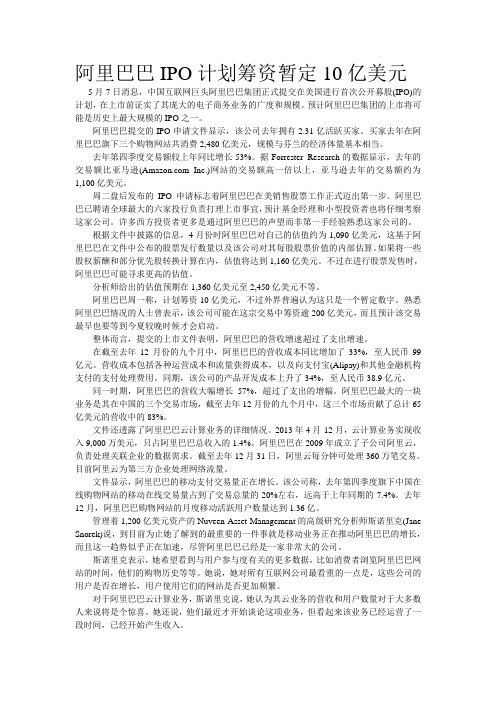
阿里巴巴IPO计划筹资暂定10亿美元5月7日消息,中国互联网巨头阿里巴巴集团正式提交在美国进行首次公开募股(IPO)的计划,在上市前证实了其庞大的电子商务业务的广度和规模。
预计阿里巴巴集团的上市将可能是历史上最大规模的IPO之一。
阿里巴巴提交的IPO申请文件显示,该公司去年拥有2.31亿活跃买家。
买家去年在阿里巴巴旗下三个购物网站共消费2,480亿美元,规模与芬兰的经济体量基本相当。
去年第四季度交易额较上年同比增长53%。
据Forrester Research的数据显示,去年的交易额比亚马逊( Inc.)网站的交易额高一倍以上,亚马逊去年的交易额约为1,100亿美元。
周二盘后发布的IPO申请标志着阿里巴巴在美销售股票工作正式迈出第一步。
阿里巴巴已聘请全球最大的六家投行负责打理上市事宜,预计基金经理和小型投资者也将仔细考察这家公司。
许多西方投资者更多是通过阿里巴巴的声望而非第一手经验熟悉这家公司的。
根据文件中披露的信息,4月份时阿里巴巴对自己的估值约为1,090亿美元,这基于阿里巴巴在文件中公布的股票发行数量以及该公司对其每股股票价值的内部估算。
如果将一些股权薪酬和部分优先股转换计算在内,估值将达到1,160亿美元。
不过在进行股票发售时,阿里巴巴可能寻求更高的估值。
分析师给出的估值预期在1,360亿美元至2,450亿美元不等。
阿里巴巴周一称,计划筹资10亿美元,不过外界普遍认为这只是一个暂定数字。
熟悉阿里巴巴情况的人士曾表示,该公司可能在这宗交易中筹资逾200亿美元,而且预计该交易最早也要等到今夏较晚时候才会启动。
整体而言,提交的上市文件表明,阿里巴巴的营收增速超过了支出增速。
在截至去年12月份的九个月中,阿里巴巴的营收成本同比增加了33%,至人民币99亿元。
营收成本包括各种运营成本和流量获得成本,以及向支付宝(Alipay)和其他金融机构支付的支付处理费用。
同期,该公司的产品开发成本上升了34%,至人民币38.9亿元。
阿里巴巴集团今天向美国证券交易委员会提交IPO招股书

阿里巴巴集团今天向美国证券交易委员会提交IPO招股书中国商业巨头阿里巴巴集团(Alibaba Group Holding Ltd.)于今天在美国正式提交首次公开募股的计划. 这很可能是历史上最大规模的IPO之一.阿里巴巴称计划通过IPO筹资10亿美元, 而分析师预计阿里巴巴IPO数额将有可能赶超脸书2012年164亿的筹资.淘宝,天猫和聚划算都是阿里旗下.阿里巴巴集团今天向美国证券交易委员会提交IPO招股书,计划赴美上市。
招股书显示,阿里巴巴集团计划通过此次交易筹集10亿美元资金,拟在纽约证券交易所或纳斯达克(4080.76, -57.30, -1.38%)全球市场挂牌,股票交易代码尚未确定。
阿里巴巴集团详细股权报告:马云持股8.9%阿里巴巴集团持股情况其中,1,903,177股普通股为马云持有,35,000,000股普通股由APN Ltd.,持有,马云在APN Ltd.,中拥有70%的股权,35,000,000股普通股由SymAsia Foundation Limited持股;65,097,160股普通股由JC Properties Limited持有,JC Properties Limited由马云家族控制。
67,000,336股普通股和2,100,000股由ernate Solutions Management Limited 持有,通过JSP Investment Limited由马云家族控制。
阿里巴巴集团董事局执行副主席蔡崇信持有83,499,896股,占比为3.6%,软银为阿里巴巴集团最大股东,持有797,742,980股,占比为34.4%。
软银持股中466,826,180股普通股由软银直接持有,15,000,000股由软银旗下SBBM Corporation持有,315,916,800股由软银旗下SB China Holdings Pte Ltd.持有。
雅虎当前持有阿里巴巴集团523,565,416股普通股,占22.6%。
阿里巴巴IPO为什么引人关注?
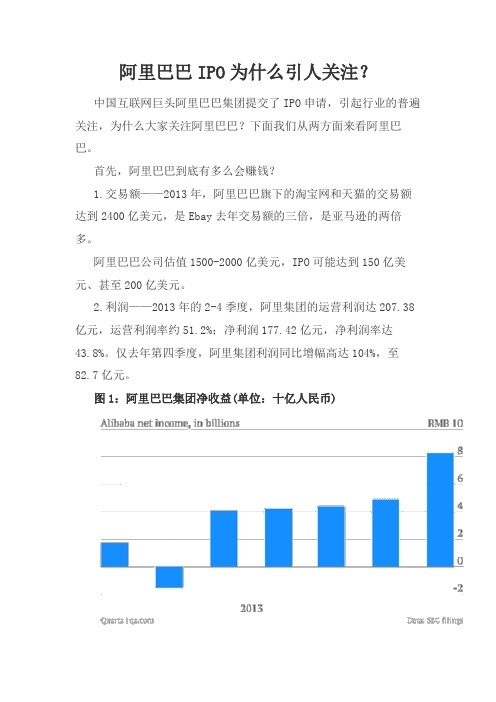
阿里巴巴IPO为什么引人关注?中国互联网巨头阿里巴巴集团提交了IPO申请,引起行业的普遍关注,为什么大家关注阿里巴巴?下面我们从两方面来看阿里巴巴。
首先,阿里巴巴到底有多么会赚钱?1.交易额——2013年,阿里巴巴旗下的淘宝网和天猫的交易额达到2400亿美元,是Ebay去年交易额的三倍,是亚马逊的两倍多。
阿里巴巴公司估值1500-2000亿美元,IPO可能达到150亿美元、甚至200亿美元。
2.利润——2013年的2-4季度,阿里集团的运营利润达207.38亿元,运营利润率约51.2%;净利润177.42亿元,净利润率达43.8%。
仅去年第四季度,阿里集团利润同比增幅高达104%,至82.7亿元。
图1:阿里巴巴集团净收益(单位:十亿人民币)3.营业收入——2013年的2-4季度,阿里巴巴总收入为404.73亿元。
其中营业收入跃增57%,约为65亿美元。
仅去年第四季度,阿里巴巴销售额增长62%,至187.5亿元。
图2:阿里巴巴销售额(单位:十亿人民币)4.成本——2013年第二至第四季度,阿里巴巴各类运营成本合计同比增长33%,增至15.9亿美元,产品开发成本同比增长34%,增至38.9亿美元。
仅去年第四季度,阿里巴巴总成本同比攀升52%,至99.4亿元(约合16亿美元)。
图3:阿里巴巴总成本总支出(单位:十亿人民币)第二,阿里巴巴IPO的前景如何?1.定义阿里巴巴阿里巴巴是中国最大的电子商务公司,按某些衡量标准来看,甚至是世界上最大的电子商务公司。
阿里巴巴旗下最主要的三个网站:淘宝、天猫和阿里巴巴拥有上亿用户,也是承载数百万宗交易的平台。
单论交易量而言,世界上没有一家电子商务公司可以和阿里巴巴相提并论。
电子商务阿里巴巴身处世界上发展最快的电子商务市场——中国,是中国最受欢迎的在线购物平台。
去年阿里巴巴旗下网站的交易额达到了2400亿美元,比eBay和亚马逊加起来还要多。
市场资本总值上市之后,阿里巴巴不仅将跻身全球最具价值的科技公司之列,也将成为中国市值最高的上市公司之一,与中国的一些大型国有企业并驾齐驱。
几个典型ipo案例

04 爱奇艺IPO
爱奇艺概况
成立时间
爱奇艺成立于2010年。
业务范围
涵盖在线视频、电影、电视剧、综艺等多个领域。
用户规模
拥有庞大的用户群体,是中国领先的在线视频平台之一。
融资历程
在IPO之前已经完成了多轮融资,投资方包括多家知名机构和公司。
42亿美元。
在上市前,美团进行了多轮 融资,吸引了众多知名投资 者,如红杉资本、高瓴资本
等。
美团在上市过程中,向投资 者展示了其强大的商业模式 和盈利能力,同时也表达了 对未来发展的信心和规划。
美团IPO结果
01
美团上市后,股价表现良好,一度突破100港元,市值一度超过1万亿港元。
02
美团的上市成为了中国科技公司赴港上市的标杆之一,也为中国互联网产业的 快速发展注入了新的动力。
几个典型IPO案例
目录
• 阿里巴巴IPO • 京东IPO • 拼多多IPO • 爱奇艺IPO • 美团IPO
01 阿里巴巴IPO
阿里巴巴概况
01
阿里巴巴是中国最大的电子商务公司之一,成立于
1999年,总部位于杭州。
02
公司业务涵盖了电商、云计算、数字媒体和娱乐等多
个领域。
03
阿里巴巴通过淘宝、天猫等平台为消费者和企业提供
融资用途
募集资金主要用于技术 研发、内容采购和市场 营销等方面,以进一步 提升用户体验和市场份 额。
对行业影响
爱奇艺的成功IPO对在线 视频行业产生了积极的 影响,推动了行业的发 展和竞争格局的变化。
05 美团IPO
美团概况
美团是一家成立于2010年的中国互联网科技公司,总部位于北京,主要从事本地生活服务电商业务, 旗下拥有美团、大众点评等知名品牌。
- 1、下载文档前请自行甄别文档内容的完整性,平台不提供额外的编辑、内容补充、找答案等附加服务。
- 2、"仅部分预览"的文档,不可在线预览部分如存在完整性等问题,可反馈申请退款(可完整预览的文档不适用该条件!)。
- 3、如文档侵犯您的权益,请联系客服反馈,我们会尽快为您处理(人工客服工作时间:9:00-18:30)。
Alibaba’s IPO
The journey of 102 years begins
At long last, Alibaba reveals details of its massive public flotation
Sep 6th 2014 | SHANGHAI | Business and finance
“DEAR investors,” begins the letter from Jack Ma, a remarkable Chinese entrepreneur who has risen from an obscure life as a teacher to become one of the world’s richest businessmen. “If you invest with us, you will be embarking on a journey with Alibaba.” The missive from Mr Ma (p ictured), the founder and chairman of China’s largest internet firm, is part of an amendment to the firm’s prospectus filed on September 5th with America’s Securities and Exchange Commission. This long-awaited update reveals the most anticipated bit of fin ancial news in a long while: how much Alibaba’s shares will cost during its forthcoming initial public offering (IPO) in New York.
The answer surprised many. Alibaba is pricing its offering at between $60 and $66 a share. That could lead to a valuation of the firm above $160 billion, surpassing the one achieved by Facebook at its flotation two years ago. The firm also looks to raise above $20 billion with this placement, which would make it one of the biggest IPOs in history.
That makes this a colossal deal, but market observers were surprised by the humility evident in the offering—not the hubris. Such is the excitement among investors worldwide for Alibaba’s shares that some expected its shares to be even pricier. Pundits had predicted a valuation of $200 billion or more for the firm. Some wild-eyed enthusiasts have even claimed that this is a
hyper-growth firm that could one day be worth a trillion dollars.
So what explains the decision to price the IPO thus? One reason the firm’s management has taken a conservative tack is the desire to avoid the sort of mess that followed Facebook’s flotation, which saw the American firm’s shares plunge in value in the wake of the IPO. Of course, the social network’s shares have bounced back nicely since then, but this early performance is widely seen as a fiasco. Particularly given the suspicions many American investors have about Chinese stocks (understandable given the recent history of dodgy offerings by obscure firms dubbed “fraud caps”), Alibaba’s owners do not want to give investors any reason to be skittish about their company.
Another reason for their caution is the failed earlier flotation on the Hong Kong exchange of , the firm’s business-to-business division. This was the company’s first business line, but it has stagnated while the fortunes of Taobao and Tmall, respectively its gargantuan consumer-to-consumer portal and business-to-consumer site, have skyrocketed. The firm priced the earlier
flotation rather greedily, and found that there was nowhere to go but down. In the end, it decided to take the entire division private at an inflated price in order to quell shareholder unrest.
So how much is Alibaba really worth? There are good reasons to hop onto the magic carpet. The firm utterly dominates Chinese e-commerce on both personal computers and mobile devices. This is hugely profitable because China is both the world’s biggest e-commerce market and also its biggest market for smartphones. Thanks to its first-mover advantage and enormous scale, the firm is also well positioned to benefit from the rise of the country’s middle classes.
But that does not mean Alibaba is a good share at any price. The firm’s cosy, near-monopoly position atop China’s e-commerce markets is now being challenged vigorously by a number of rivals. JD, a local rival which has just completed its own successful IPO in America, is coming after Alibaba aggressively with an “asset-heavy” e-commerce business model akin to Amazon’s—a stark contrast with Alibaba’s emphasis on maintaing “ass et-light” platforms like Taobao that leave warehousing, inventory management and so on to others. Baidu and Tencent, well-funded local internet rivals, are now also targetting e-commerce with inventive offerings.
So the journey looks to be a wild ride—but if Mr Ma gets his way, at least it will not be a short one. In his investor letter, he makes this promise: “Since our founding in 1999, we have helped millions of small businesses to achieve a brighter future, and we hope to do this for at least 102 years.”。
